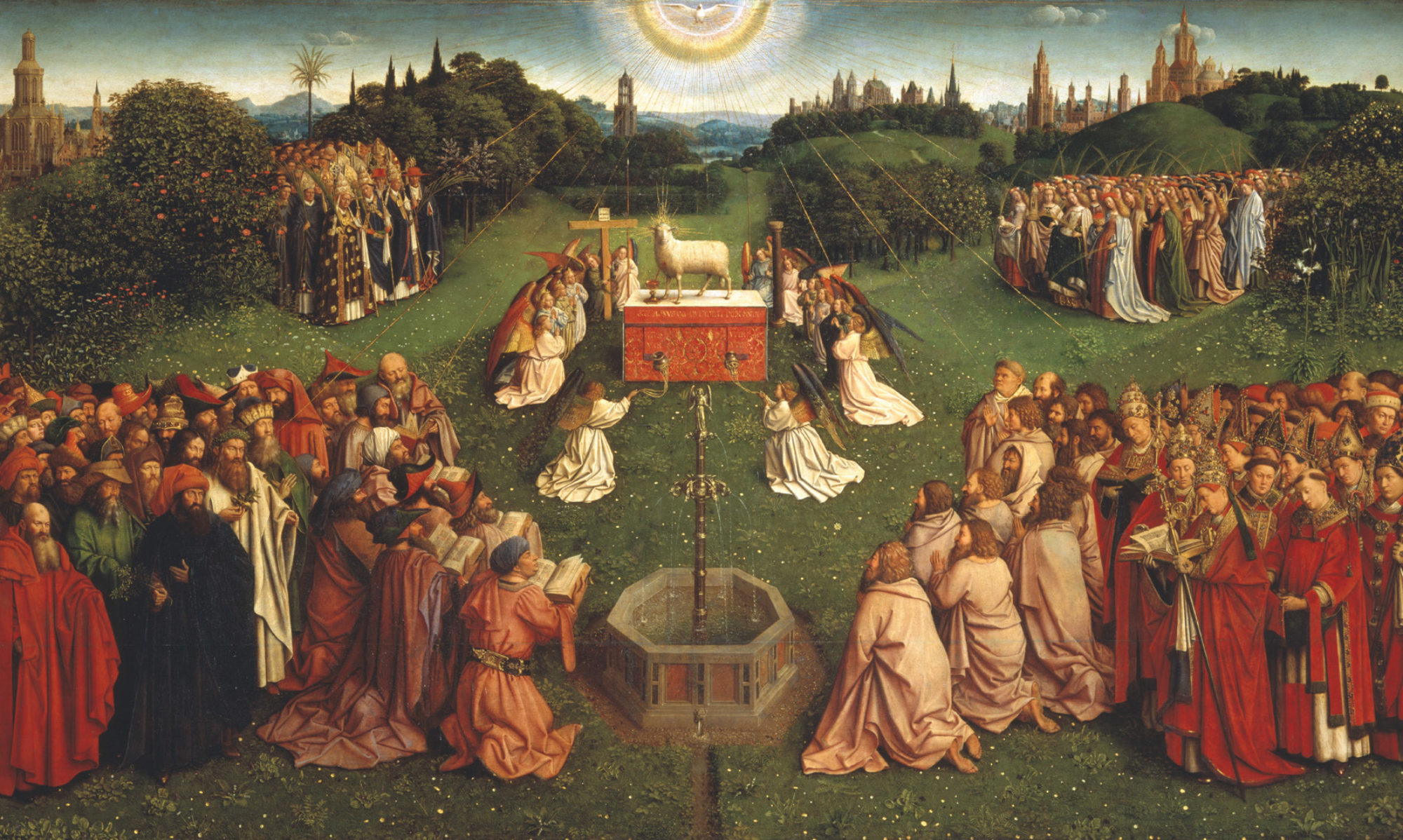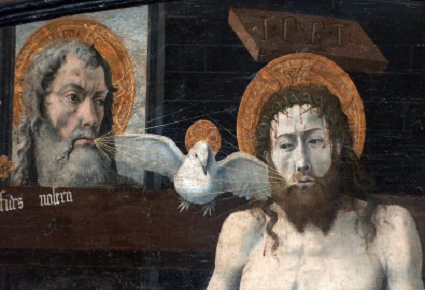The question of the procession of the Holy Spirit remains a bone of contention between the Greek East and the Latin West. The Greeks have historically denied the doctrine known as Filioque (literally, “and from the Son”), the Latin Christian belief that the Holy Spirit proceeds from the Father and the Son, as stated in the Niceno-Constantinopolitan Creed. The Greek Orthodox have rejected and continue to reject this teaching, stating instead that the Holy Spirit proceeds from the Father alone. The Church has had no lack of talented saints and theologians arguing in favor of the Latin tradition; in this essay, we will examine the arguments of St. Anselm of Canterbury against the Greek position and in favor of the double-procession of the Spirit. St. Anselm (d. 1109) was one of the most important churchmen of his age. He was a rigorous theologian and is considered one of the fathers of the Scholastic movement.
St. Anselm’s famous work on the Holy Spirit is De processione Spiritus Sancti, which, though containing important contributions to Trinitarian theology in its own right, was written to defend the western doctrine of the Filioque against the Greeks.
In this pivotal work, Anselm refines the distinctions between indivisible unity and incompatible diversity within the Godhead in order to establish a framework from which to argue the double-procession of the Spirit. He distinguishes two basic expressions (1) “God from whom God exists” and (2) “God from God”. Now, each of the three Persons of the Godhead has a unique position or relation within this framework. The Father is unique because he is God from whom God exists, because the Son and the Spirit proceed from Him; but He is not God from God, because He Himself proceeds from none and is not begotten. The Father is the “ground” of the Trinity; in other words, He is 1 but not 2.
The Son, on the other hand, is both 1 and 2. The Son both is begotten by the Father and is God from God, as well as spirating the Spirit, who proceeds from the Son. The Holy Spirit, then, is 2 but not 1, because He proceeds from the Father and the Son but neither the Father nor the Son proceed from or are begotten of Him. Or, to make it simpler:
Father: 1 but not 2
Son: 1 and 2
Holy Spirit: 2 but not 1
The purpose of these distinctions is to argue a true plurality among the Persons of the Godhead and explore their relations to one another, and in this point Anselm argues that both Latins and Greeks are in agreement. From this common ground, Anselm says, “Having advanced these premises, let us inquire how, in God, the indivisible oneness and the irreducible plurality are related to each other.” (1) This relationality will demonstrate the double-procession of the Spirit.
It is important to understand that the Greeks do not deny that the Spirit has some relation to the Son; some confess that the Spirit proceeds from the Father through the Son; others will note that since the Holy Spirit has to be the Spirit of someone, He must be the Spirit of the Son. The Scriptures say as much (cf. Rom 8:9; 1 Pet. 1:11). So the Greeks do not deny any relation with the Son and the Spirit—such would be to break the unity of the Godhead. Rather, they deny that that relation is one of procession. The Spirit does not proceed from the Son but the Father alone, though He does have some relation to the Son, at least so say the Greeks.
Anselm agrees with the Greeks that if the plurality of Persons and the unity of the Godhead is to be maintained, the Son and the Spirit must be in some sort of relation. But if the relation is not one of procession, of what sort is it? Here Anselm argues that only procession makes any sense. Divine Revelation reveals only two ways that God can be from God: being begotten or proceeding. If the Spirit does not proceed from the Son, the only other way He can be in relation to the Son is to be begotten by Him. But Anselm argues that this would be unfitting, for it would make the Spirit the Son’s Son even as the Son is the Father’s Son. In other words, it would make the Holy Spirit into a grandson, which is absurd.
But, if the Son and the Holy Spirit are in some sort of relation, then either the Holy Spirit must proceed from the Son or the Son from the Holy Spirit. Anselm obviously argues in favor of the former, since if the Son proceeded from the Holy Spirit, the Holy Spirit would be the Father of the Son, something with no warrant in Christian Tradition, which clearly affirms the Son is begotten by the Father. To say otherwise would make the Father and the Holy Spirit identical with regard their relations. The Son cannot proceed from the Spirit because He would be the Son of the Spirit; but since the Scriptures refer to the Spirit as the Spirit of the Son, it makes sense to conclude that the relation between the two is that the Spirit proceeds from the Son as well as the Father.
Anselm also resorts to the Scriptures to prove the double-procession. In John 15:26, Jesus says that He will send the Spirit from the Father; Jesus is the agent who “sends” the Spirit. In John 14:26, it is the Father who “sends” the Spirit but He does so in Jesus’ name. Clearly, both the Father and the Son are portrayed in the Gospel of John as “sending” the Spirit, and neither is said to do so exclusively.
Anselm also makes an interesting observation on Matthew 11:27, “No man knows the Son except the Father, nor does anyone know the Father except the Son and anyone to whom the Son chooses to reveal him.” Anselm wonders whether the Holy Spirit may be counted among those who “know” the Father and the Son? If the Holy Spirit did not have knowledge of the Son and the Father, He would be less than either and hence not God. Obviously the Spirit does have this knowledge, but how does He possess it? Anselm allows only two possibilities: that the Son had to reveal the knowledge of the Father to the Spirit just as He does to creatures, or else the Spirit knows it by virtue of sharing His essence with the Father and the Son. Anselm uses this dilemma to argue the necessity of the double-procession. Let him speak for himself:
“If the Greeks are unwilling openly to resist the truth, then let them choose one of the two alternatives: either (1) the Holy Spirit does not know the Father and the Son unless the Son reveals [this knowledge to Him], or (2) because of the fact that insofar as the Father and the Son know each other they are one with the Holy Spirit, then when they are said to know each other, it follows necessarily that the Holy Spirit is included in this knowledge. Surely, there is no middle course provided [the Greeks] do not want altogether to take away this knowledge from the Holy Spirit or altogether to take away truth from the words of Truth, both of which things true confession curses. For Truth speaks as follows: “No one knows the Son except the Father; and not anyone knows the Father except the Son and him to whom the Son chooses to reveal [this knowledge].”Now indeed, if they opt for the Holy Spirit’s knowing the Father and the Son by means of the Son’s revelation, then the Holy Spirit has this knowledge from the Son, and this knowledge is, for the Holy Spirit, nothing else than His being. Hence, He exists and proceeds from the Son, since He proceeds from the one from whom He exists.
On the other hand, suppose they [opt for] maintaining: when the Father and the Son are said to know each other, then because the essence through which they know each other is the same for the Holy Spirit, it follows that the Holy Spirit shares this knowledge. [In that case], when they read that the Holy Spirit proceeds from the Father, about whom the Son says “ I and the Father are one”: let them confess with us, because of the essential identity of the Father and the Son, that the Holy Spirit without doubt proceeds also from the Son.” (2)
Thus, unless we want to maintain the absurdity that the Spirit has no inherent knowledge of the Father, we are compelled to admit that the Spirit proceeds from the Son and the Father doubly.
Anselm will also make the case that the Spirit can in no way be considered the “Spirit of Christ” or the Spirit of the Son if He does not proceed from the Son:
“However, I ask those who deny that the Holy Spirit exists and proceeds from the Son how they interpret His so being the spirit of the Son that the Son sends Him as His own spirit. Do they think that the Father gave His own spirit to the Son, as to one not having [a spirit] from Himself ? (For the Son has [a spirit] either from Himself or from another. But He cannot have it from anyone else except from the Father.) In that case, the Son would have received [this spirit] from the Father, from whom He has it, and the Father would have given the Holy Spirit to the Son as to one not having [a spirit] from Himself. At this point let [the Greeks] show (since the Father and the Son and the Holy Spirit are equal, and since each one of them is sufficient unto Himself) what reason there was or what need the Son had for the Father to give His own spirit to Him rather than giving His own son to the Holy Spirit.” (3)
One Greeks argument Anselm attempts to refute directly is their assertion that Romans 11:36, which says of God that “all things are from him, through him, and in him,” refers to the relations within the Godhead, where the Father is whom all things are from, the Son all things through, and the Spirit all things in. Since the Scripture says “all things”, the Holy Spirit would be included in “all things” as something that is from the Father but given through the Son. St. Anselm’s answer is simple yet compelling; if the Greeks insist that “all things” be taken as an absolute universal, then the Father and the Son must be included under “all things” as well, which would lead to an obvious absurdity. Clearly, the Greeks cannot argue from Romans 11:36 against Filioque.
Anselm offers more arguments in the rest of his work, which is 16 chapters long; if you want to read the entirety of this important treatise, you can click here to download a PDF version of St. Anselm’s De processione Spiritus Sancti. His arguments are not exhaustive and should be supplemented by other theological treatises on the subject, but they provide a very solid footing for discussions about the Filioque and form an important contribution to the corpus of western Latin theology.
(1) De processione Spiritus Sancti, 1
(2) ibid., 7
(3) ibid., 4
Phillip Campbell, “St. Anselm on the Filioque,” Unam Sanctam Catholicam, July 30, 2015. Available online at: http://unamsanctamcatholicam.com/st-anselm-on-the-filioque

